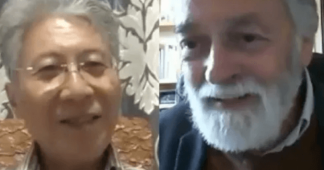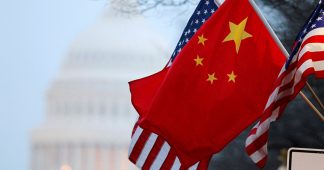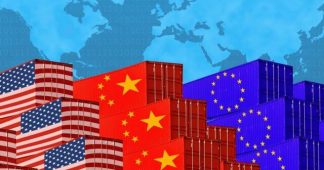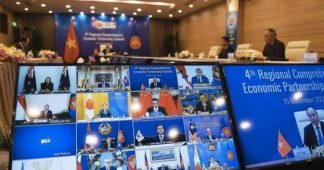Dec 28, 2021
Editor’s Note:
Forget how US media outlets once declared 2020 as the “worst year ever.” Half of Americans are calling 2021 the “worst year of their lives so far,” according to a new survey (by OnePoll). The US kick started 2021 with a black swan event – the Capitol riots. Will the world witness more black swan events in the year to come? In what ways can China break free of the US’ unrelenting containment? Global Times reporters Li Aixin and Li Qingqing (GT) talked to Zheng Yongnian (Zheng) about these issues. Zheng is presidential chair professor, acting dean of the School of Humanities and Social Science and the Founding Director of the Advanced Institute of Global and Contemporary China Studies, the Chinese University of Hong Kong, Shenzhen. He has recently published a new book, Opportunities in a Rapidly Changing International Environment (Research Series of Guangdong Academy of Greater Bay Area Studies).
GT: In your new book, you put strong emphasis on the significance of opening-up on China’s development, while noting the US should also open up the international system to more countries. How would you describe the US’ opening-up?
Zheng: The US has been stressing the so-called reciprocal opening-up. But there are other kinds of opening-up of the US. In modern times, it once forced other countries to open their doors to the US with guns and cannons, like what European imperialist countries did. The US is also a country of immigrants. Since the World War II, the US has been opening up unilaterally to European talent. Over the past few decades, it has also opened up toward talents from developing countries like China and India. Talented immigrants from other countries make a great contribution to the US’ development.
In addition, the US has also been forcing state-owned enterprises from some countries, including China, to be more open as a part of a labor market that fits Western standards.
US’ policies on opening-up are all favorable to itself. Otherwise, the country is definitely closing its doors. For example, the US does not allow its high-tech products to be sold to China, nor does it allow Chinese high-tech companies like Huawei to operate on US soil.
GT: You said that former US president Donald Trump has left Washington, but Trumpism has not. Given this background, do you think the Capitol riot could happen again? To what extent will peaceful transition of power in the US be shaken?
Zheng: Trump is gone, but Trumpism remains. There is phrase in the US, the “Trump Revolution.” Yet the cause of the revolution is neither China nor Russia, but the US itself. The middle class in the US is shrinking, the wealth gap is widening. In the past, the US called itself a middle class society, now it calls itself a plutocracy. Their society is highly divided and highly unfair. White populism is rising. Internal economic structure has become unbalanced.
However, the two parties in the US government are fighting against each other fiercely. There is no effective government. And the US has so far failed to adjust its economic structure efficiently.
As long as US social economic problems still exist, Trumpism will not go away. Occupy Wall Street and the Capitol riot are the same, except the latter was more radical. No one can guarantee such events won’t happen again in the future, as unstable elements within the US are still being fermented.
GT: Will a black swan event take place in 2022? In which field will it occur?
Zheng: In a such decentralized society like the US, any trivial matter can trigger a black swan event. The mid-term elections are approaching. Both the Republican Party and the Democratic Party are becoming increasingly radical, and both sides have their own political correctness.
Some observers are very concerned about whether US Vice President Kamala Harris will succeed President Joe Biden due to the latter’s health issue. But I attach more importance on a crisis within US society.
The US claims to be a country of the rule of law, but ever since the death of George Floyd, there is no law or order in the US. It has almost become a country of an anarchy. And if real anarchy genuinely happens in the US, it would be a huge black swan event.
The gap between the rich and the poor is widening, and epidemic has not been brought under control. Economic problems are far from being fixed. Gun control has been discussed among Americans for a long time. But once a crisis comes, people feel that guns can bring them a sense of security. Such contradictory phenomenon keeps occurring all the time in the US.
Black swan events are unpredictable. But people should still be fully prepared psychologically: The US is a very fragile society, and anything can happen.
GT: Where is the US’ bottom line of its policy toward Taiwan island? You previously said that if the US continues to promote Taiwan secessionism, it will trigger a war. Do you think the Biden administration is capable of preventing interest groups from kidnapping the entire China-US relations over the Taiwan question?
Zheng: The Biden administration hopes that the two countries will not face an open conflict or even a war over the Taiwan question. But that’s it. The US has no bottom line over the issue. It has broken through red lines time and time again.
Due to so-called pluralism and diversity of American politics, many US politicians do not comply with any given administration. Not to mention the US administration itself is also breaking through the bottom line. The US Taiwan policy has been largely held hostage by vested interest groups. In fact, Biden is also very worried about this situation. The US administration has lost control on its policy over the Taiwan island, just like the fact it has lost control on its domestic affairs.
For China, the Taiwan question is not about driving the US out of the Western Pacific, it is a matter of our country’s reunification, and there is no room for any compromise.
The vested interest groups in the US disregard their national interests for their own interests. Take US Greater Middle East Initiative, Afghanistan policy, and Iraq policy, they were not the policies for the US, but the policies for vested interest groups, which dragged the entire country into a quagmire. The way the US withdrew from Afghanistan has made the whole country ashamed.
Vested interest groups in the US are pursuing their own interests. They won’t work so hard if they are pursuing national interests. It is those groups that dragged the US into wars and used national interests to disguise their private interests. On the Taiwan question, they are doing the same and we must be well aware.
GT: Much China-US friction stems from the US’ challenging of China’s core interests. Given the need for the bilateral cooperation between the two. To what extent will the US respect China’s core interests in the future, or reduce its hostility toward China?
Zheng: The pattern of interaction between China and the US has changed, it’s almost impossible imagining returning to the way things were before. US Secretary of State Antony Blinken said, “Our relationship with China will be competitive when it should be, collaborative when it can be, and adversarial when it must be.”
But I think we need to divide “confrontation” into two parts: One is controllable confrontation, and the uncontrollable part will turn to open conflicts. So there are four aspects in China-US ties, cooperation, adversary, confrontation and conflict.
The China-US relationship cannot be described as black and white. The two countries will definitely cooperate, for example, their cooperation on climate issues is already on the agenda. The two countries should cooperate on public health issues as well. This explains why Biden chose to rejoin the WHO after Trump’s withdrawal.
The China-US relationship is multi-faceted and complicated. It not only has a competitive side. But in fact, China and the US are competing in all aspects. For example, if the US cracks down on China’s high-end chips, will China not fight back through stronger competition? If Washington calls China-US competition a struggle between “US democracy” and “Chinese autocracy,” should we accept it? Competition cannot be avoided. We must compete. As for confrontation, should we confront the US on the questions of Hong Kong, Xinjiang and Taiwan? It is impossible for us to “surrender,” and we must safeguard our interests.
Meanwhile, we need to be rational and see the essence of China-US relations and the US policies. It is not that the entire US is on the same page when it comes to China. The US is composed of various interest groups, and US policies depends on which interest group has the greater influence on the policy making process.
China-US relations are not solely decided by the US. If the US wants to launch a cold war against China, China does not necessarily need to fight the cold war. We have the ability to avoid a cold war with the US, as well as any conflict. The country is capable of containing various US unfavorable policies toward China.
GT: What’s your opinion on China-India relations in 2022? After the video meeting between Chinese and US leaders, India has somewhat slowed down its pace of confrontation with China, while continuing to seek balance between the US and Russia. Do you think India will continue its strategy of uniting the US against China, or will it make some adjustments after realizing that this will not bring real benefits to itself?
Zheng: Indian society appears lost to some extent. India’s system is fragmented, but the country has a strong nationalist sentiment against China. Different parties in India always use nationalism against China to promote the country’s internal solidarity. But this is wrong.
The economies of China and India complement each other. Chinese businesses have played a role in advancing India’s economic development. The US and the West have been talking about helping India develop. But after all those years of British colonization, the UK failed at this task. Western countries have been talking about how India is also a democratic country like themselves, but did they contribute to India’s development? I am sure Indian Prime Minister Narendra Modi knows the answer in his heart.
India is adjusting its policy now, including policies on China, the US and Russia. In the end, India’s choice depends on its domestic politics.
It is hoped the Modi government can consolidate its power thorough pushing domestic development, instead of through nationalism against China, otherwise, India’s international environment will negatively impacted. India’s nationalism either targets China or Pakistan, but both countries are India’s neighbors. If New Delhi cannot even manage relations with neighbors, it would be very hard for it to boost economic development well.
GT: Australia has been one of the most “loyal” allies in following the US’ China policy. Do you think China-Australia relations will further decouple in 2022? In the 2022 Australian federal election, to what extent will the opposition party and voters affect Australia’s China policy?
Zheng: Just like the US, Australia has different views on its China policy. The Australian business community hopes to maintain a relatively friendly relationship with China. They want to make money and do not want to give up on China’s big market. However, the Australian government uses ideology to deal with China. The question depends on how Australia’s internal political power will balance with its economic power. Just like India, ideological and political anti-China acts cannot resolve Australian economic problems.
On the positive side, Australia’s people-to-people and commercial exchanges with China have not been interrupted. Besides, the RCEP will come into effect soon. RCEP can become a very important leverage to promote China-Australia relations. However, it depends on whether Australian politicians will take care of its citizens’ welfare and the interests of the business community or will simply stick to ideological positions.
GT: The US will keep roping in allies to enhance its containment of China. In what ways do you think China can make breakthroughs to deal with the US’ unrelenting suppression?
Zheng: One thing would be enough – opening-up. As long as China opens up, as long as Western countries are capitalist, be it the US, European countries or Japan, the two sides will not decouple.
China’s economy is an integral part of the global system. China needs the world, and the world needs China. Likewise, the US also needs the world, and the world needs the US.
The so-called decoupling and alliance against China has been initiated and hyped by officials and politicians. Does the Wall Street want to abandon China? China has a middle class of 400 million people, which is equivalent to the total population of the US. China is the world’s largest single unified market. The US needs China.
We remind our readers that publication of articles on our site does not mean that we agree with what is written. Our policy is to publish anything which we consider of interest, so as to assist our readers in forming their opinions. Sometimes we even publish articles with which we totally disagree, since we believe it is important for our readers to be informed on as wide a spectrum of views as possible.











